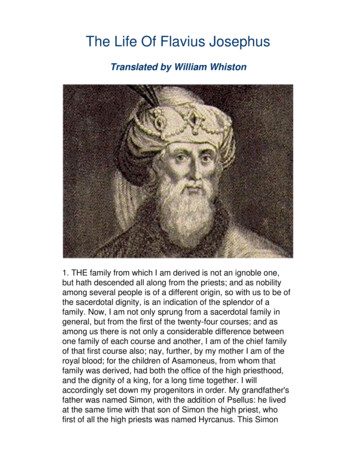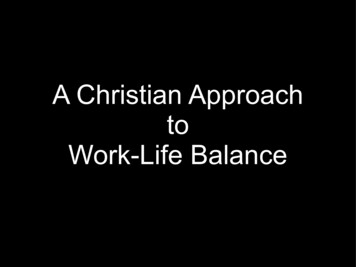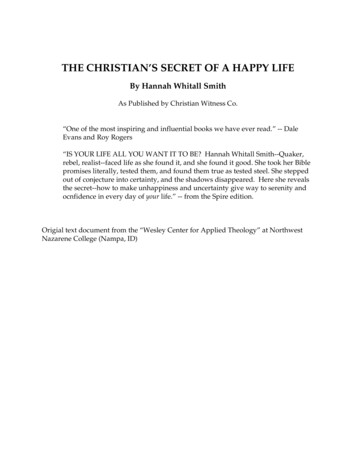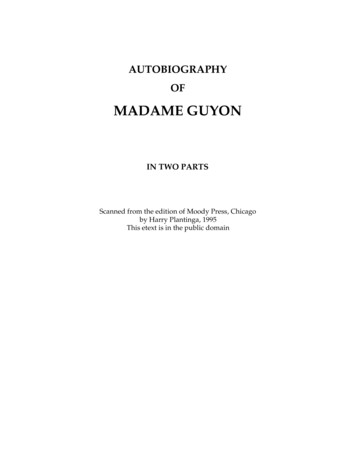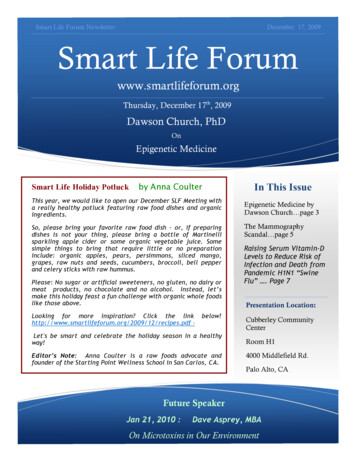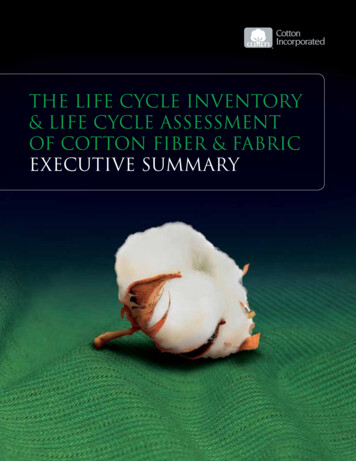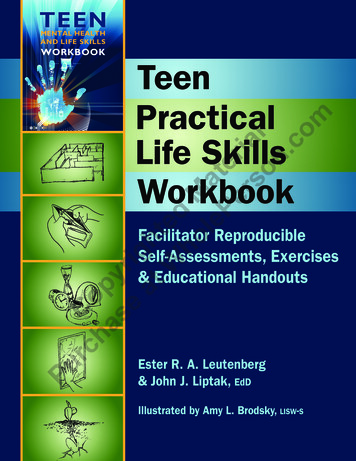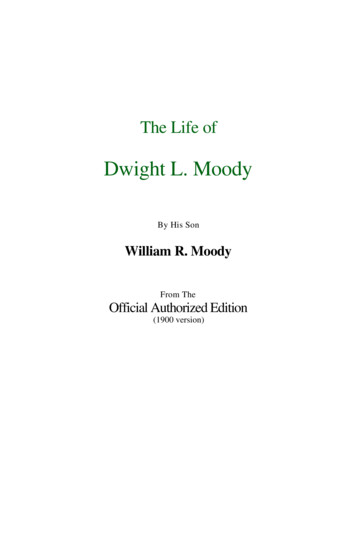
Transcription
The Life ofDwight L. MoodyBy His SonWilliam R. MoodyFrom TheOfficial Authorized Edition(1900 version)
61837-1899The Autobiography ofDWIGHT L. MOODYSome day you will read in the papers that D.L. Moody, ofEast Northfield, is dead. Don’t you believe a word of it! Atthat moment I shall be more alive than I am now, I shallhave gone up higher, that is all; out of this old claytenement into a house that is immortal — a body that deathcannot touch; that sin cannot taint; a body fashioned likeHis glorious body.I was born of the flesh in 1837. I was born of the Spirit in1856. That which is born of the flesh may die, that which isborn of the Spirit will live forever.
7INTRODUCTIONTpreparation of my Father’s biography has been undertaken as asacred trust. Early in the spring of 1894 he was asked by an oldfriend for permission to issue a biography with his approval. Thismy father declined to do, and, on that occasion, expressed the wish that Ishould assume the task when his life-work was ended. In reply to myobjection that such an undertaking demanded a literary experience that Idid not possess, he said: “I don’t care anything about that. What I want isthat you should correct inaccuracies and misstatements that it would bedifficult to straighten out during my life. You are the one to do this. All myfriends will unite on you and give you their assistance. There are manywho think they know me better than any one else, and would feelthemselves best able to interpret my life. If you do not do this work therewill be many inaccurate and conflicting ‘Lives.’”HEWhatever diffidence I have felt in executing this trust, it has beenundertaken as a filial duty and esteemed to be a great privilege. It wouldhave been my choice to have had more leisure for accomplishing the work,but the announcement of unauthorized biographies has necessitated theimmediate publication of the present volume. Otherwise the desire of myfather would have been thwarted. At a later date it is intended that a morestudied interpretation of his life should be prepared to meet the expresseddesire for a fuller account of his career.I would gratefully acknowledge the kindness of many friends who havecontributed important data and incidents. Special acknowledgment is alsodue to Rev. John Bancroft Devins, of “The New York Observer,” whosevaluable assistance has greatly facilitated the early completion of the work.Father lived solely for the glory of God and for the spread of the Gospelof Jesus Christ. It is the earnest prayer of his family that in this record ofhis career his life’s purpose may be conserved.WILLIAM R. MOODYEAST NORTHFIELD, M ASS .April 10, 1900.
8TABLE OF CONTENTSCHAPTER I EARLY LIFE — Puritan ancestry — Moody and Holton families —Two hundred years in Northfield — Parentage — Early death of father — Struggle ofwidowhood — Young Sunday school missionaries — Trust in God — Home disciplineCHAPTER II LEAVING HOME — A child’s adventurous journey — Love offun — In the country schoolhouse — The pleasure worth the whipping — Ruling bylove — A young horse-trader — A bright cent for the new boy — Ambition for largersphere — Going to Boston — Disappointment — Behind the counter — Boyish pranksCHAPTER III CONVERSION — Church attendance — Influence of a Sundayschool teacher — Personal effort — A blessing in return — Admission to churchmembership deferred — Received later—Business and ChristianityCHAPTER IV IN BUSINESS IN CHICAGO — Attraction of the new West— First experiences in the enterprising city — Revival times — As a commercialtraveller — Business successCHAPTER V FIRST ATTEMPTS AT CHRISTIAN WORK — Arecruiting officer for a mission Sunday-school — The “North Market” Mission —Among the hoodlums — Busy Sundays — Novel methods — Muscular Christianity —Visit of Abraham Lincoln — Interesting sketch of extending influence — UnappreciatedenthusiasmCHAPTER VI GIVING UP BUSINESS — A large trust — Putting new lifeinto a dead prayer meeting — A struggle and a decision — The turning point — A classwon for Christ — Increasing zeal — Into the highways and hedges — Praying with theRoman Catholic bishop Abrupt methodsCHAPTER VII CITY MISSIONARY WORK — Varied occupations — Smallbeginnings — “Crazy Moody” — Among the waifs — Inspiration from Bible characters— New method of preaching — A friend’s testimonyCHAPTER VIII THE CIVIL WAR AND THE CHRISTIANCOMMISSION — Outbreak of the War — Mission boys off for the War — Quakerprinciples — In Camp Douglas — Among Confederate prisoners — Work at the front —In the hospital — Messages from the dying — The text that brought life — A personalexperience — Major Whittle — General Howard — The Spanish War — Message to thechurches— The new Christian Commission
9CHAPTER IX SUNDAY-SCHOOL CONVENTION WORK — Sundayschool methods — Widening influence — A novel prayer meeting — Numerous calls —A discouraged church — The tide turned — To carry the county for Christ— Uniformlessons — National ConventionCHAPTER X EARLY EVANGELISTIC EFFORTS — The growth of the“North Market Hall” — Organizing a union church — Extended activities — Faith inearly conversions — “Then you must be D L. Moody” — Resenting an insult —Heartfelt confession — Prayer in a billiard hall — How to reach the poor — Ever ready tolearnCHAPTER XI CHRISTIAN ASSOCATION WORK — An enthusiasticworker — Noon prayer meetings — First permanent Association building in America —Farwell Hall burned — Rising from the ashes — “The lightning Christian” — Raisingfunds for Association work — Impressing others into service — Evangelistic effort —Open-air preachingCHAPTER XII YOUNG MEN’S CHRISTIAN ASSOCIATIONCONVENTIONS — Meeting of Mr. Moody and Mr. Sankey — Their first jointservice — A week together in Chicago A permanent engagement — Association hints —Dealing with trampsCHAPTER XIII FIRST VISIT TO GREAT BRITAIN — Anxious to studyEnglish methods of work — First address in London — Startling unconventionality —Starting the London noon prayer meeting — Visit to Bristol — “Wholly consecrated”— “I will try to be that man” — “I was there” — Warm friends wonCHAPTER XIV INFLUENCE OF HENRY MOOREHOUSE — A newepoch — The boy preacher — John 3:16 — One text for a full week — The man of onebook — A strong friendshipCHAPTER XV THE CHICAGO FIRE AND ITS RESULTS — Biblecharacters — The life of Christ — A question left unanswered — A new resolve —Thirst for spiritual power — Chicago in ruins — A humorous incident — A strugglewith the elements — Love wins — Among the ruins — Rebuilding — A sacredexperience — Induement of power — Letter to the churchCHAPTER XVI FIRST EXTENDED MISSION IN GREAT BRITAIN— A preliminary visit — A wonderful experience in London — Prayer answered —Home again — Urgent invitations to work in England — Left Chicago with Mr. Sankey— A time of testing — Arrival in Liverpool — Startling news — The courage of faith —“Will be in York tonight” — Only moderate success — In the North of England —Rapidly-growing interests — Recollections of Rev. F. B. Meyer — Sunderland andNewcastle — Pressing for decision
10CHAPTER XVII BIRTH OF THE “MOODY AND SANKEY HYMNBOOK” — Newcastle the birthplace — Scarcity of American hymns — Sacred songsand solos — How the royalties were used — Completing the church in Chicago — Anew book for American use — The American royalties — “Singing up buildings atNorthfield” — The statement of William E. Dodge — Opinion of an eminent lawyer —Experience of George C. Stebbins — A tribute from James McGranahanCHAPTER XVIII THE AWAKENING IN EDINBURGH — ConservativeScotland — A noonday meeting established — Hearty endorsement by leadingclergymen — Sankey’s “kist o’ whistles” — Opposition withdrawn — The FreeAssembly Hall — Sectarian barriers removed — Circular letter to every minister inScotland — A slanderous letter from Chicago amply refuted — Testimony of Dr.Horatius BonaCHAPTER XIX IN GLASGOW AND THE SCOTTISH TOWNS —Preparatory services — Sympathy of Dr. Andrew A. Bonar — Mammoth gathering in theBotanical Gardens — In other Scottish centers — Forty years an invalid — How to meetthe tempter — Henry Drummond — Summary of results by W. Robertson NicollCHAPTER XX IRISH AND ENGLISH CITIES — In Belfast — A generalcall to Christians — Hearty union of churches — Londonderry — Christian work inDublin — In English towns — Testimonies from the ministry— A watch-night service— Estimate of Dr. W. R. Dale — Sermon from the four-leaved book — Appeal forYoung Men’s Christian AssociationsCHAPTER XXI THE LONDON CAMPAIGN — Reason for delayed visit toLondon — Use of printers’ ink — Great halls engaged — The great need of themetropolis — Influential helpers — Personal statement from Mr. Moody — Answeringobjections — His creed — Success from the first — A word of warning — Hand-to-handwork — Strange crowds — Opposition and misrepresentation — Caricatures of the press— Lord Chancellor Cairn’s sympathy — The tide turns — Endorsed by “The LondonTimes” — A letter from the Archbishop of Canterbury — Typical meeting described —Mr. Moody’s regard for the Sabbath — Meeting with Mr. Gladstone — Charles H.SpurgeonCHAPTER XXII THE LONDON CAMPAIGN CONTINUED — Greatgathering of children — Busy days — Christian conventions — With Eaton boys atWindsor — Farewell meetings — Summary of the London work — Leaving England —Testimony as to resultsCHAPTER XXIII RETURN TO AMERICA — Reintroduced to his owncountry — Rest at Northfield — Purchasing a home — Besieged
11with invitations — Early plans for Northfield schools — Whittle and Bliss in Northfield— Past experiences and future plansCHAPTER XXIV BROOKLYN, PHILADELPHIA, AND NEW YORK— Mr. Moody’s influence with men of affairs — The campaign opened in Brooklyn —Influential endorsement — Supported by the press — Philadelphia — Old PennsylvaniaRailroad Depot — Work among inebriates — The passing of the year — The venerableDr. Plumer as instructor — Mr. Moody as an inquirer — New York — A strongcommittee — A remarkable Sunday morning service — The great evening throngs — Avivid portrayal — Estimates of the work — Thurlow Weed — Where are the convertstodayCHAPTER XXV CHICAGO AND BOSTON — Welcomed in his old homecity — Death of P. P Bliss — Large accessions to Chicago’s churches — In culturedBoston — Testimony of Joseph Cook — Missions in other cities — Later campaigns indifficult fields — Value of the individual — Objection to counting converts — Variousmissions comparedCHAPTER XXVI SECOND EXTENDED MISSION IN GREATBRITAIN — Visiting former fields — Illustrated sermons for the young — A Scottishtour — In England and Ireland — The crowning work in London — Extensivepreparations — Great portable tabernacles — Hymn-book royalties — Reaching allclasses — In Satan’s strongholds — Closing convention — A brief rest — Origin ofDrummond’s “Greatest Thing in the World” — A mutual testimonyCHAPTER XXVII LATER MISSIONS IN AMERICAN CITIES —Many centers moved — Interesting incidents — How a jailer was caught — On thePacific coast — Too much reputation — Celebrating his sixtieth birthday — Refusing togrow old — Bearing a governor’s pardon — Invitation to AustraliaCHAPTER XXVIII NORTHFIELD SEMINARY — Influence of his brotherSamuel — Henry F. Durant and Wellesley College — Purchasing a school site —Dedication of East Hall — The plan of the schools — Study and recreation — TwentiethanniversaryCHAPTER XXIX MOUNT HERMON SCHOOLS — First purchase of land— A generous gift — Original plan for young boys — Nominal fees— Manual labor —The school routine — Various courses — Religious atmosphere — Temptation Hill —An international gift — A former student’s testimonyCHAPTER XXX THE BIBLE INSTITUTE FOR HOME ANDFOREIGN MISSIONS — Application entered for grandchildren — “Gap-men”training school — Tent work — Bible institutes — Permanent abode — Thorough
12organization — Continuous terms— Systematic Bible study — Training for the serviceof song — Record of ten years’ workCHAPTER XXXI AMONG COLLEGE STUDENTS — The spirit of collegestudents — Occasional visits to American colleges — Notable visits to Cambridge andOxford — Cambridge students make sport of the meetings — Discouragements —“Some mothers’ sons” — Changing sentiment — Deep impressions — Studentopposition repeated at Oxford — “Playing with forked lightning” — Fair play for aninvited guest — Apology and support — A positive stand and a complete victory —College students’ conferences — The Student Volunteer Movement — WidespreadinfluenceCHAPTER XXXII NORTHFIELD CONFERENCES — The ChristianWorkers’ Conference — Early informal gatherings in Mr. Moody’s home — Aninspiration and the outcome — The first general call — A modern Pentecost — Threethousand requests for prayer — Conservation, common sense, and caution — Pointedsuggestions — Grace to bear rebuke — Frank retraction — Wide scope of the conferencethemes — Mr. Moody’s last conference call — Attendance of the New York Presbytery— Y. P. S. C. ECHAPTER XXXIII VISIT TO THE HOLY LAND — Kind invitations —Touching responses — Few real holidays — Final acceptance — With St. Paul in Rome— The Pope’s money not good in Rome — In the land of the Pharaohs — Off forPalestine — Carriage ride to Jerusalem — On holy ground — Preaching on Calvary —Hebron — Bethlehem — The Mount of Olives — Making friends with native children— Backsheesh — Easter in the Holy City — Return to Egypt, Italy, and England —Working while restingCHAPTER XXXIV CAPACITY FOR WORK — Magnificent constitution —Genius of generalship — Desire to visit Australia — Disappointment — Invitation toScotland accepted — Christmas day meetings — Visit to Ireland — A trying schedule— Almost exhausted — Medical examination and a warningCHAPTER XXXV IN PERIL ON THE DEEP — Sailing from Southampton— A fine steamer — Bright prospects — A terrible shock — A broken shaft — Asinking vessel — Terrified passengers — An awful night — Seven hundred soulsawaiting their doom — Gen. O. O. Howard — Steamer in sight — Rescue — Eightanxious days — Safe in port — Thanksgiving — A new start — Welcome homeCHAPTER XXXVI WORLD’S FAIR CAMPAIGN — A great opportunity— The man for the hour — Planning ahead — A vow taken — Burning zeal — Greatgeneralship required — Strange meeting-places — In the theaters — The great circus tent— Wonderful financial support — World-wide prayers — Marvelous interest — Greatresults
13CHAPTER XXXVII THE USE OF THE PRESS — Appreciating its power— Attitude regarding its criticisms — Personal statements — No compromise withSunday papers — The Gospel in print — Convention reports — Bible notes — Printedsermons — Ingersoll and Moody — Dearth of religious literature in small cities —Country districts worse — A heroic plan — The Colportage Library — Far-reachingeffects — The Gospel in the prisons — Definite resultsCHAPTER XXXVIII PREPARING SERMONS — Professor Drummond’sestimate — Early attempts at public address — First “Bible readings” — How sermonswere prepared — Topical study — Should a sermon be repeated? — Envelopecompilations — Three necessary books — Mr. Moody’s BiblesCHAPTER XXXIX ASKING AND ANSWERING QUESTIONS —Learning as well as teaching — Other men’s thoughts — The temperance problem —What can a layman do? — The “after-meeting” — The use of the stereopticon —“Would you advise one to go into the ministry?” — Elocution — Too many churches— How to reach strangers — Unconverted church members — How to reach young men— How to overcome nervousness — Aiming at the heartCHAPTER XL LATER EXPERIENCES WITH THE YOUNG MEN’SCHRISTIAN ASSOCIATIONS — Continued loyalty to the organization —Lifting financial burdens — Zealous for evangelistic effort — 150,000 secured forBrooklyn Association, 200,000 for New York — A wise investment in St. Louis —Saving the Philadelphia Association from collapse — Use of hymn-book royalties —Securing a building for Richmond, Va. — 84,000 raised for San Francisco — Hisinfluence in Albany — Personal experiences — Examples of enthusiastic effort — With arailway president — A good story — Helping British Associations — Memorial tributeCHAPTER XLI THE INQUIRY ROOM — Mr. Moody’s idea — Personaldealing — Authority from the Scriptures — No set rules — Peculiar cases — Not aconfessional — Cautions and suggestions — How to become a worker in the inquiryroomCHAPTER XLII HIS BELIEF AND PRACTICE — Standing by the Book— A mutilated Bible — Christianity vs. infidelity — “I stand by Jonah” — No newremedy for sin — The Northfield platform — Mr. Moody’s church membership — Astatement of the church’s position — Methods of work — Independent but devoted —Abnegation of self — The paramount objectCHAPTER XLIII TRAITS AND CHARACTERISTICS — A character thatcould bear rigid examination — “This one thing I do” — Consecrated common sense —Often standing alone — Modest simplicity — “I am a most overestimated man” —Abhorrence of show — A hero worshipper — Determination — Intense conviction —Avoidance of “lobbies” — Judging human nature — Firm friendships — Mr. Sankey’stribute — Professor Towner’s personal testimony — Faithful in rebuke — Among his
14own townspeople — Bravery tested and not found wanting — Quick perception —Always himself — As a father confessor — A Chinese estimateCHAPTER XLIV IN THE HOME CIRCLE — Love of country life — In thebarnyard — Early rising — Affection for his mother — As a grandfather — Characteristicletters — A true husband and father — Tender and loving to the end — The loss of hisgrandchildren — His touching tributesCHAPTER XLV WITHIN THE GATES — “Were you ever homesick forHeaven?” — Tribute to his mother — “Comforted to comfort” — Kansas City — Greatgatherings — The collapse of strength — Letter to a dear friend — His last sermon — Aprophecy — The last plea — The homeward journey — Messages by the way — Backin Northfield — Days of anxiety — “Ready for either” — Last messages — “Within theportals of Heaven” — Death is not hard — No valley here — Thinking of others to thelast — Conscious to the end — An abundant entrance — His own testimonyCHAPTER XLVI AT REST ON ROUND TOP — A victor — Absence ofcrape — Triumphant mourning — His own plan — Natural in death — The funeralservices — Exultant victory — Heartfelt tributes — A call to larger service — Aremarkable incident — A token from the skies — A face illumined — Laid to rest —Round Top — VictoryCHAPTER XLVII MEMORIAL SERVICES — Meetings in London —Boston — Brooklyn — New York — NorthfieldCHAPTER XLVIII TRIBUTES FROM ENGLISH FRIENDS — Rev.F. B. Meyer — Rev. G. Campbell Morgan
15The Life of Dwight L. MoodyCHAPTER IEARLY LIFENmind the ancestry! A man I once heard of was ambitious totrace his family to the Mayflower, and he stumbled over ahorse-thief. Never mind a man’s ancestry!”EVERIn this democratic spirit Mr. Moody disposed of the history of pastgenerations, taking no credit to himself for their achievements, and feelingin no way responsible for their failings. It is nevertheless of interest thatfor two hundred years his ancestors lived their quiet lives in the seclusionof their farm homes in the Connecticut Valley. Beyond the limits of localpolitics they do not seem to have figured much in public affairs. Amongthe number there were a few professional men, and in the early strugglesfor independence, representatives of the Moody and Holton families wereamong those who counted their lives not too dear a price for those richprivileges of religious and national liberty which they sought to insure totheir posterity. But for the most part their careers were bounded by alimited horizon, and they served their day and generation in the simplestation to which they were called.As pioneers they were successful, and the same traits of character whichdistinguished his ancestors in this respect found expression, underdifferent conditions and in a more remarkable degree, in their descendant.Mr. Moody inherited from that hardy stock an iron constitution capableof great physical endurance and a capacity for hard, continuous work. Heearly developed those distinguishing traits of his New England forefathers:
16a strong love of liberty, loyalty to conviction, courage in the face ofobstacles, and sound judgment in organization; and these constituted hismost valuable legacy from his seven generations of Puritan ancestors.The earliest records of the Moody family in America date from the landingof John Moody in 1633. Settling first in Roxbury, he moved later to theConnecticut Valley, where he became one of the original proprietors ofHartford; from here he moved to Hadley, Massachusetts. At the beginningof the nineteenth century Isaiah Moody and his sons were settled inNorthfield; and the eldest of these boys was Edwin, the father of DwightL. Moody.Here for years they followed the family trade of masonry, which, in thoseearly days, included the making and burning of bricks as well as the layingof foundations and the building of houses and chimneys. To theconscientious performance of their work many an old farmhouse in andabout Northfield still bears silent witness. A member of Mr. Moody’sfamily was introduced a few years ago to a centenarian of Warwick, aneighboring village. The visitor was presented as a son of D. L. Moody,but the old farmer found a far stronger recommendation in the fact that theyoung man’s great-grandfather and grandfather had, three-quarters of acentury before, laid the foundation and built the chimney of the house theywere in; and, with a slight touch of jealous pride for the former generation,he declared that “the work was well done and had stood the test of time.”From his mother’s family, too, Mr. Moody received a goodly heritage ofPuritan pluck, the Holtons antedating the Moodys in America by threeyears. They landed in 1630, and were among the first settlers ofNorthfield, where for more than two hundred years they have beenresidents. They cherish a natural pride in the fact that, from the date of theoriginal grant from the British Crown, no deed of transfer of the old Holtonhomestead has ever been recorded. This farm, beautiful in its situation, lieson the west bank of the Connecticut River, a mile or two from NorthfieldStreet, adjoining the commanding site, purchased by Mr. Moody, uponwhich is built the well-known Mount Hermon School. Some idea of thehardships through which the Moody and Holton families passed, incommon with their neighbors, is preserved in the early records of the
17towns of Hadley and Northfield. In the local cemetery, near the MountHermon School, lie the remains of many of the Holton family, whosenames for more than seven generations are recorded on the old headstones.Betsy Holton and Edwin Moody were married on January 3, 1828. It hadbeen arranged that the ceremony should take place on New Year’s day, butthe Connecticut River had little regard for the lovers, and unexpectedlyrose above its banks after a sudden thaw. Although the young people’shomes were but four miles apart, in those days before bridges spanned theriver the swollen stream was an insurmountable obstacle even to soresolute a character as Edwin Moody, and only by making a detour ofmany miles was the marriage celebrated without a still longerpostponement. The bride was 23 years old and her husband 28 when theyleft the old Holton homestead that January evening to make a new home inNorthfield.It was a true love match between the reckless, dashing, and openhandedyoung man and his pretty wife, and for twelve and a half years theyenjoyed their happiness. God blessed their union with seven childrenduring this time, and by the skill and industry of his trade the fatherprovided amply for his family support.Dwight Lyman, the sixth child, was born February 5, 1837. The old familyrecord adds the name of Ryther, but this was early discarded. In thosedays it was customary for one who was complimented by the bestowal ofhis name upon a child to present a sheep to the baby in recognition of thehonor his babyhood was innocently conferring. The feelings of the fondparents were wounded by the omission, in Dwight’s case, of thecustomary gift, and “Ryther “ does not seem to appear again after itsentry on the record of the births in the large family Bible.It was foreign to the disposition of Edwin Moody to give much thought tothe future, and so it is not strange that he made little or no provision forthe contingency of his sudden death. When, therefore, he was strickendown without a moment’s warning at the early age of 41, the widow wasleft with practically no means of support. The homestead itself wasencumbered with a mortgage, and but for the merciful provision of the law
18securing dower rights, the widow would have been left without even ashelter for the family. The creditors took everything which they couldsecure, to the very kindling wood in the shed, and left the widow with herseven children in the utmost straits. It was at this time that one of Mrs.Moody’s brothers ministered most opportunely and generously to theneeds of the family. The supply of firewood had been completelyexhausted, and the children had been told that they must stay in bed tillschool time to keep warm. It was then that “Uncle Cyrus” Holton came tothe rescue with a load of wood, and, good Samaritan that he was, sawedand split it for immediate use.“I remember,” said Mr. Moody in later years, “just as vividly as if it wereyesterday, how I heard the sound of chips flying, and I knew someone waschopping wood in our wood-shed, and that we should soon have a fire. Ishall never forget Uncle Cyrus coming with what seemed to me the biggestpile of wood I ever saw in my life.” It was such remembrances as thesethat always made his heart vibrate with peculiar sympathy for those whowere in want.A less determined and courageous heart than the resolute widow’s wouldhave been overcome by the dark prospect for the future, but that true soulhad inherited the sturdy strength and undaunted courage which haddistinguished her early ancestors as pioneers in the new world, and with astrong faith in God she faced the conflict with poverty.Some of her neighbors urged her to break up the little home and place thechildren in families where they might be cared for by strangers. Even thosefrom whom more practical help might have been expected strongly advisedthis course, and because their advice was not accepted seemed to feel thatthey were absolved from any further duty. The birth of twins after herhusband died added greatly to the cares and difficulties of her position, andduring the long summer that followed there were many times when itseemed that the burden was too great for human endurance. It was duringthese days that Mrs. Moody’s brother aided her, and at this time, too, theold minister of the Unitarian Church, the Rev. Mr. Everett, interestedhimself in the family’s behalf.
19Shortly after the father’s death this good man visited the destitute familyand helped them both by counsel and material assistance. The olderchildren were all enrolled in the Sunday school of the church, and from thehands of this minister the entire family received the ordinance of baptism“in the name of the Father and of the Son and of the Holy Ghost.” Nosooner had the attendance of the Moody children been secured than theywere commissioned to bring in other scholars. In a sense, therefore, Mr.Moody’s Sunday school mission work began at an earlier date than iscommonly supposed, for as a child he and his brother George frequentlyacted as aggressive home missionaries in securing recruits for the villageSunday school.With the sole care of so large a family the religious instruction in the homewas not so thoroughly doctrinal as in some households of today, but themother instructed her children in the true religion of the heart that seeksfirst God and His righteousness, and though Dwight at 17, as a member ofa young men’s Bible class in Boston, was bewildered by the request toturn to a simple Scriptural reference, it is doubtful if any of his amusedcompanions were more thoroughly established in “pure religion andundefiled before God and the Father” than he. Certainly none was purerand more innocent in heart than the keen, awkward country boy.It was not till after he left home that his actual personal conversionoccurred, but it was to a tender conscience and an open heart that thegospel invitation was given, and a soul already trained to love and honorGod readily accepted His offer of salvation. The Christian training of hismother and the faithfulness of her good pastor were a sacred remembrancein all his after experiences, and he ever spoke appreciatively of the debt heowed to the ministry of Mr. Everett.“Trust in God” was the brief creed of his mother’s simple Christian faith,and early in life the children learned to love that God and pray to Him whois the strength of the fatherless and the widow. Many evidences of thethoroughness with which this lesson was taught to Dwight and hisbrothers are found in their early experiences.
20One night in the late fall Dwight’s older brother, a boy of 12, and himself,then only 8 years of age, started to a neighboring farm about four milesaway, where they had secured employment in the cutting of broom corn.Boylike, they had not started on their journey until the evening had set in,and long before they reached the old ferry across the Connecticut River ithad become very dark.Hand in hand they crossed the meadow to the landing, and then shoutedover the river for the ferryman to bring his skiff. Soon they could hearvoices and see a lantern approaching from the opposite bank. Then a voiceshouted across the flood that one man would cross the river with the boat,while the other would remain where he was with the lantern to direct theircourse. In the intense darkness they soon lost sight of the approachingboat, and for a long time they could hear nothing of the ferryman, who hadbeen carried far down the stream by the swift current. After somesuspense they heard the boat approaching along the bank of the river, andfinally the
but the announcement of unauthorized biographies has necessitated the immediate publication of the present volume. Otherwise the desire of my father would have been thwarted. At a later date it is intended that a more studied interpretation of his life should be prepared to meet the expressed desire for a fuller account of his career.File Size: 1MB
